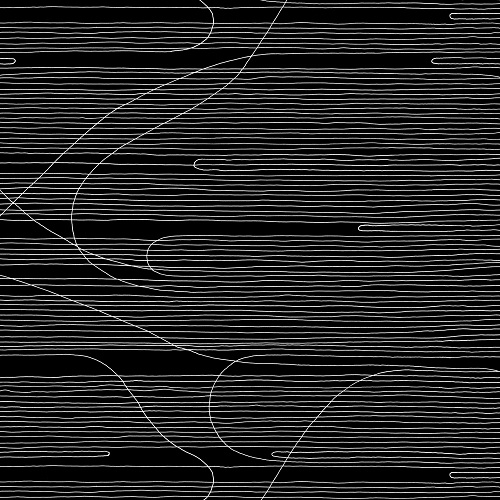So Oneida’s monumental Thank Your Parents trilogy reaches its end with Absolute II, and as ever when examining at the last in a series, it’s impossible not to gaze backward over its prequels and attempt to identify some sort of distinct narrative that runs through the lot. Unsurprisingly for Oneida, whose music over the course of this series has become dense to the point of acquiring its own gravitational pull, it’s tough to divine anything as simplistic as a storyline – but its titles, aesthetic and sonic development all contribute to something of an overall theme. Of course, this could all simply be a matter of personal projection, but with a record as intensely introspective, and achingly conceptual, as Absolute II, it would seem a shame to write a review without heading down the spiral.
So over the course of its length, Thank Your Parents has represented something of a breaking down of Oneida, a process of paring back every element until all that remains is the vaguest memory of their former selves. The Descent Of O, perhaps, but that idea’s historical connotations (the gradual development from single-celled organism to complex, multicellular thinking, acting, rocking machines) imply the process as moving forward in time. This series of records shows evolution in reverse, a band devolving from Preteen Weaponry through the zero-time triptych of Rated O and a return to the womb at Absolute II, which finally arrives at an unconscious, primordial, fluid-filled space.
I seem to have been making regular references to J.G. Ballard recently, and particularly The Drowned World, but this gradual dissolution perfectly mirrors that book’s central conceit: the sun’s rays have finally penetrated the atmosphere and their full force is starting to unravel the stability of the human genome, triggering a behavioural shift backward in time and a slow, steady loss of rational thought. Similarly, while Oneida’s central fixation has always appeared to be rhythm, an obsession driven by Kid Millions’ relentlessly inventive drum work, over the course of the series they’ve gradually stripped even that away to leave Absolute II: humid, dense, formless. The clue lies in its opener’s title, ‘Pre-Human’, which couldn’t be more apt.
If that sounds like a lofty idea to project onto a series of records, it probably is, but it’s also fitting for a project of this scale. It’s also hard not to feel that the band, given their history, would enjoy their music’s potential for open analysis. With Each One Teach One, Oneida had already secured their reputation as one of the world’s finest rock bands, a group willing to look beyond the dogmatic boundaries of what constitutes ‘rock’ music to embrace hypnotic motorik repetition and dub-heavy rhythm section interplay. The following few albums, while lacking its sheer visceral impact, further rewired the O’s hybrid genome. But over the course of Thank Your Parents – and especially its monumental centerpiece, the three-disc Rated O – the group comprehensively bathed their cells in solar radiation, dragging in mutant dancehall (‘Brownout In Lagos’), chugging Lynchian dreamscapes (’10:30 At The Oasis’), North African desert blues (‘O’) and blank, sprawling ambience (‘End Of Time’).
So the four longform tracks that make up Absolute II make most sense in the context of the records that came before them. Taken by itself, it could easily be construed as a difficult and forbidding album, despite its essential warmth and submerged sound, but played as part of the trilogy it’s an essential final chapter. ‘Pre Human’ consists of little but the slow throb of synth and pinpricks of fluid melody that flicker around its border regions. Album centrepiece ‘Horizon’ is more abrasive, cut down its centre by the grind of a massive engine and the record’s only vocal performance, a lonely and jagged spoken word piece. And ‘Gray Area’ appears to examine a tiny slice of the preceding track in microscopic detail, all furtive periods of near-silence punctuated by sudden sharp shocks of guitar. And appropriately for an end-point of all things, closer ‘Absolute II’ is completely featureless, a flat and sad expanse of nothing stretching outward in all directions. But to suggest Absolute II only works alongside its predecessors would do it a disservice. As ever, Oneida’s ability to make experimental music fun pervades, and there’s a slick sense of humour to even its darkest moments. The key to the group’s appeal lies not only in their music but also in the way it’s delivered – and that they never end up several leagues up their own backsides is testament to their subtle self-awareness.
The other immediately noticeable thing about Absolute II is the influence of the band’s Ocropolis practice/performance space, which they’ve brought to two ATP festivals over the last couple of years. At last year’s Godspeed You! Black Emperor-curated Christmas event they took over a venue for an entire day, remaining on stage for a full ten hours and playing with guest musicians including Chris Corsano, Deerhoof and The Dead C. The band’s seamless and fluid approach to the day’s performance was reflected in its musical output, which frequently found itself occupying similarly sparse territories as Absolute II. Without knowing how much transfer of material and ideas there was between the three installments of Thank Your Parents, it’s difficult to know quite how much these collaborative sessions affected the group’s mentality while recording its final volume – but it’s still tempting to imagine that Oneida’s musically crossbreeding nature found its ideal arena in shared stage space.


